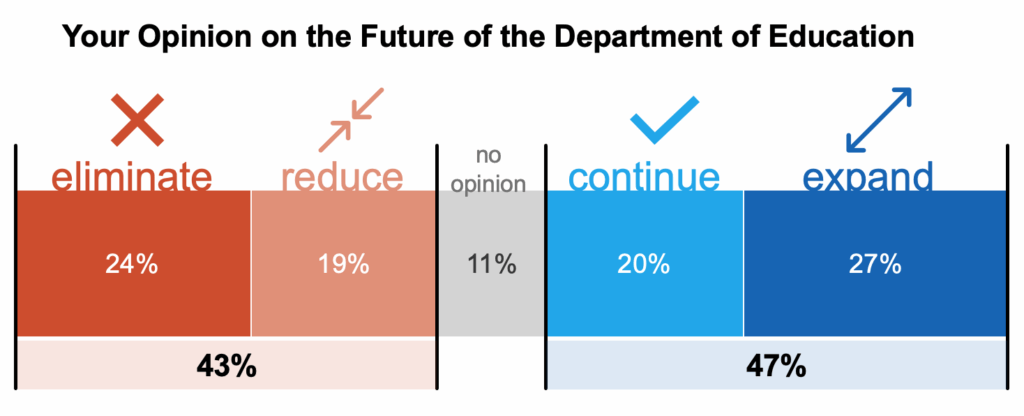By Bruce Blakeman (SVP, Public Policy)
Key Takeaways:
- Americans are deeply divided on the future of the U.S. Department of Education, with nearly equal support for expanding or eliminating it.
- Federal vs. state control of education is at the heart of the debate, reflecting broader ideological and political divides.
- Survey insights reveal complexity: 47% support maintaining or expanding the Department, while 43% favor scaling it back or eliminating it.
- Demographics matter: Support for the Department varies significantly by gender, race, political affiliation, marital status, and parental status.
- Conservatives and Republicans are more likely to support reducing federal involvement in education.
- Liberals, women, and minority groups tend to favor a stronger federal role in shaping education policy.
- Subgroup surprises challenge assumptions—college graduates and parents are more likely to support reduction than expected.
- The future of education policy is a defining issue in America’s cultural and political landscape heading into 2025.
The debate over the Department of Education is heating up as political winds shift in Washington. With calls to scale back the federal government echoing through Congress, the future of the Department of Education has become a flashpoint for policymakers, educators, and the public alike. In this moment of uncertainty, one thing is clear: Americans are sharply divided on whether the Department of Education should remain a cornerstone of federal policy or be dramatically reduced-or even eliminated.
A Nation at a Crossroads: The Department of Education in the Spotlight
Recent political developments have put the Department of Education at the center of a national conversation. As lawmakers propose sweeping reforms to reduce federal spending and return power to the states, the Department’s role is being scrutinized as never before. The question is simple, but the answers are anything but: Should the federal government continue to oversee education policy, or is it time to rethink its involvement altogether?
The Numbers: Americans Split Down the Middle
Our latest survey of 1,000 Americans reveals a nation without consensus on the Department of Education. About 47% believe the Department should continue as it does today, or even be expanded with a larger budget. In contrast, 43% feel it should be significantly scaled back or eliminated entirely.
Digging deeper, the data shows that 24% of respondents favor eliminating the Department of Education and shifting its funding to the states. Meanwhile, 27% support expanding the Department and increasing its budget. The rest fall somewhere in between, reflecting a complex landscape of opinion that defies easy categorization.

Understanding the Divide: Who Wants What?
The divisions over the Department of Education run deep, cutting across lines of gender, ethnicity, party affiliation, ideology, marital status, and family structure. The numbers tell a revealing story:
- Republicans (67%) and conservatives (72%) are far more likely to support scaling back or eliminating the Department of Education.
- Whites (46%) and men (52%) also lean toward reduction or elimination.
- On the other side, women (53%), Democrats (45%), Blacks (53%), Hispanics (50%), and liberals (74%) are more likely to favor maintaining or expanding the Department’s role.
These divisions are not just political-they’re personal. The debate over the Department of Education is as much about values and identity as it is about policy.
Subgroup Surprises: Marital Status, Children, and Education Level
Some of the most intriguing findings come from looking at specific subgroups:
- Married people (49%) are more likely than singles (36%) to support shrinking or eliminating the Department of Education.
- Households with children (46%) are more likely than those without (40%) to favor reduction or elimination.
- College graduates (44%) show more support for reducing the Department than those without a high school degree.
These results challenge some common assumptions about who supports federal involvement in education-and why.
The Case FOR the Department of Education
Supporters of the Department of Education argue that it plays a vital role in ensuring equal access to quality education across the country. They point to the Department’s efforts to enforce civil rights laws, distribute funding to underserved communities, and set national standards that help all students succeed.
Proponents also warn that eliminating or reducing the Department could lead to greater disparities between states, with wealthier areas able to provide better education than poorer ones. For many, the Department of Education is a safeguard against inequality and a driver of national progress.

The Case AGAINST: Arguments for Scaling Back or Eliminating the Department of Education
Opponents counter that the Department of Education represents federal overreach into an area best managed by states and local communities. They argue that education policy should reflect local values and needs, not one-size-fits-all mandates from Washington.
Critics also point to bureaucratic inefficiency and question whether federal involvement actually improves educational outcomes. For these Americans, scaling back or eliminating the Department is a way to empower states, reduce government spending, and restore local control.
The Political Context: Why This Debate Matters Now
The debate over the Department of Education is unfolding against a backdrop of broader efforts to shrink the federal government. With budget deficits rising and political polarization intensifying, calls to devolve power to the states have gained traction.
At the same time, education remains a top concern for voters, making the Department of Education a symbolic battleground in the fight over the future of American governance. The outcome of this debate will shape not only education policy, but also the balance of power between Washington and the states for years to come.
Conclusion: A Nation Still Debating Its Educational Future
As the debate over the Department of Education continues on, one thing is certain: Americans are far from united on the path forward. With nearly equal numbers calling for expansion and elimination, the future of the Department–and federal involvement in education–remains an open question.
For professionals, educators, and policymakers, this is a moment to engage, listen, and lead. The decisions made now will shape the educational landscape for generations to come. Whether you believe the Department of Education should be reimagined, reduced, or reinforced, your voice matters in this crucial national conversation.
Connect with Bruce Blakeman to learn more about Heart+Mind’s work in the education policy sector.
Survey Methodology: The survey consisted of 1,000 online interviews conducted April 1-11, 2025. Respondents for this survey were selected from among those who have volunteered to participate in online surveys and polls.
The data (approximately 1000 respondents) is gathered from of one of the largest online panels, which attempts to approximate a cross-section of the US population. To ensure representation of a wide variety of demographic groups we impose quotas by age, gender, and ethnicity based on US Census data for people aged 18 and older.
